
Michelle Troconis, Jennifer Dulos, and Jon Schoenhorn.
A Connecticut defense attorney who represents a woman accused in connection with the high-profile murder of Jennifer Dulos is fighting an attempt by prosecutors to force him off of the case — all because he possessed evidence that he hopes will torpedo the state’s theory of the case.
According to court paperwork distributed by Hartford attorney Jon Schoenhorn, prosecutors have filed a motion to disqualify his “continued representation” of Michelle Troconis, the one-time live-in girlfriend of the late accused murderer Fotis Dulos.
“Schoenhorn should be disqualified,” the state wrote, for two reasons. First, prosecutors argued, “he is likely to be a necessary witness in the impending trial, and thus there is a compelling need for his testimony.” Second, they asserted, “he is laboring under a potential conflict of interest with a likelihood of it developing into a substantial actual conflict.”
Fotis Dulos was accused of killing his estranged wife Jennifer Dulos on May 24, 2019, in the middle of a bitter child custody dispute. The body of Jennifer Dulos has never been found, but authorities say the amount of blood found in her New Canaan home indicates that she could not have survived an attack perpetrated upon her.
Fotis Dulos died by suicide while his own murder case was pending. Authorities alleged that he borrowed an associate’s truck, parked some distance from his estranged wife’s home, clandestinely traveled there using a unique bicycle he had owned for years, and then killed her; he is then alleged to have disposed of evidence in storm drains and garbage receptacles near Hartford — approximately an hour away from the initial New Canaan crime scene — along with Troconis.
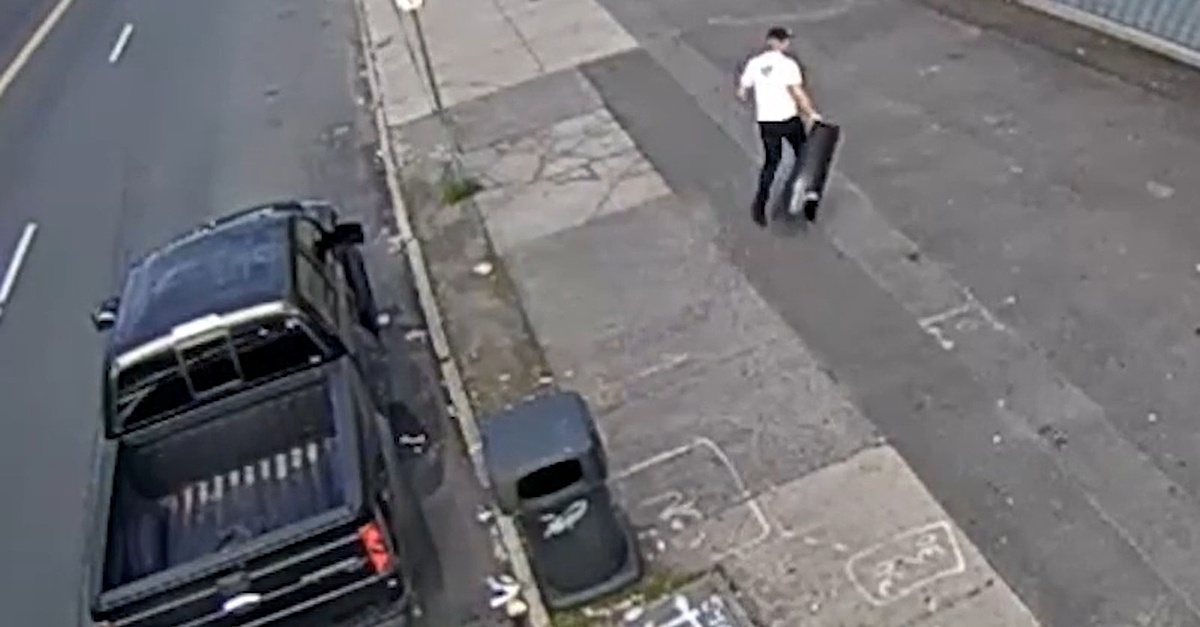
A man identified as Fotis Dulos was caught on camera allegedly disposing of evidence that he killed his wife. (Evidence photo.)
The accusations of significant premeditation amid financial woes for the allegedly murderous husband shocked the wealthy Connecticut communities where Jennifer and Fotis Dulos lived.
Fotis Dulos’s suicide left Troconis and Kent Mawhinney — an attorney for Fotis Dulos — to face the rap for Jennifer’s death.
Troconis is charged with conspiracy to commit murder, two counts of tampering with physical evidence, two counts of conspiracy to commit tampering with physical evidence, and hindering prosecution in connection with the death of Jennifer Dulos. She was initially represented by attorney Andrew Bowman but eventually settled on Schoenhorn’s services on Feb. 5, 2020. Schoenhorn has taken a more aggressive approach to the representation, in part because his retention came shortly after Fotis Dulos died on Jan. 30, 2020 and the state looked to hold someone else primarily responsible for the killing.
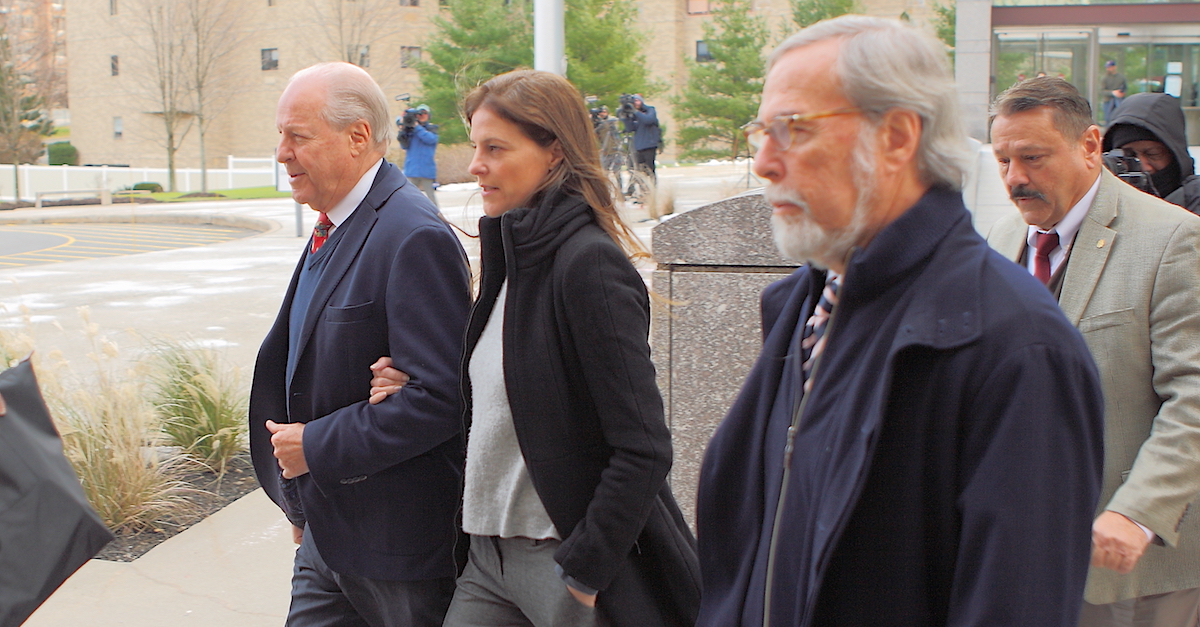
Michelle Troconis (center) leaves a courthouse in Stamford, Conn., in December 2019 with her father (left) and her onetime defense attorney Andrew Bowman (right, in glasses and a blue jacket). (Image via Aaron Keller/Law&Crime.)
What happened in 2021 is the subject of the state’s motion to boot Schoenhorn off the case.
On March 23 of that year, state police detectives Corey Clabby and Nicholas Olivetti responded to a New Haven law office then occupied by Tara Knight, who is now a Superior Court judge. Knight indicated that she was in possession of a “banker[‘]s box related to the investigation into the murder,” the state wrote.
Three attorneys were present when Clabby and Olivetti arrived: Knight, Hugh Keefe, and Noor Abu-Hantash.
The state’s motion to disqualify Schoenhorn explains:
Knight, citing attorney-client privilege, refused to reveal who gave her the box or how it came into her possession. Knight did, however, state the following in sum and substance: She had not looked inside of the box; however, she had been assured by her ‘client’ that the contents of the box had a direct connection to the investigation. She was unaware of the contents of the box and would not comment any further, answer any questions, or provide a statement to police. She avowed that she would have to be subpoenaed for further comment.
Clabby opened the box “to ensure that its contents were safe for transportation and storage.” Inside were four items of interest, the document states: “(1) one letter from Schoenhorn to Knight, dated February 2, 2021; (2) one sealed Ziploc bag with a white plastic clip containing a dark blue or black garment; (3) one black Husky flathead screwdriver; and (4) one black Husky wrench.”
The letter allegedly said simply that Schoenhorn was “enclosing a blue sweatshirt that I received from another attorney.”
When Clabby showed Knight the letter, she “questioned aloud why Schoenhorn would include the letter in the box, and she commented that Clabby and Olivetti were now aware of who gave her the box,” the state wrote.
Back in an evidence lockup, the constabulary ascertained that the hoodie was a black and blue Original Weatherproof Vintage hooded sweatshirt, size large. Attached to the hood was a “hair or fiber” which was later examined. The hair contained the DNA profiles of Troconis and “one unknown contributor.” The sweatshirt contained the DNA of Pawel Gumienny, a Fotis Dulos staffer, and “three unknown individuals” in several locations.
Authorities have long alleged that Fotis Dulos used Gumienny’s red Toyota Tacoma truck to travel to New Canaan to murder his wife. Gumienny has cooperated with the investigation.
After further analysis, prosecutors wrote that the screwdriver contained the DNA of Troconis and “three unknown individuals,” none of whom were Gumienny. The wrench contained the DNA of Troconis and two others; neither were Gumienny.
The items contained neither the DNA of Jennifer Dulos nor Fotis Dulos.

Jennifer Dulos. (Image via the New Canaan Police Department.)
According to prosecutors, Schoenhorn suggested during a July 8, 2022 videoconference that surveillance video which showed someone bicycling in dark clothing not far from the victim’s house actually showed Gumienny, not Fotis Dulos, and that the hoodie in question was the same dark clothing worn by the person in the video. Believing that Schoenhorn was aiming to suggest that Gumienny was the killer, prosecutors then averred that “Schoenhorn could become a necessary witness should he attempt to introduce said evidence.” In essence, they wrote, Schoenhorn would have to testify as to the chain of custody of the hoodie and the tools: “where the sweatshirt came from, how it came into his possession, and how it was handled.”
“I know where it came from,” Schoenhorn allegedly responded as to the hoodie, but he refused to vouchsafe any details; rather, he told prosecutors to ask Gumienny.
An Aug. 8, 2022 phone call between prosecutors and Schoenhorn went similarly. Schoenhorn said he was “ethically” required to turn the material over but that he was “not legally in a position” to reveal anything else; later, on Sept. 6, 2022, he said both the attorney-client and the attorney work product privileges prevented him from saying more.
That commentary generally comports with legal ethics discussions that deal with similar situations: attorneys have to turn physical evidence over to the authorities but cannot reveal privileged information.
Gumienny, when shown the hoodie, allegedly told the authorities that he was unsure whether that precise article of clothing belonged to him but noted that he indeed owns “similar shirts and jackets.” He said he did not recognize the tools. He also said that a hoodie or jacket he found in a red bucket his vehicle on May 28, 2019 — four days after Jennifer Dulos violently vanished — was probably lighter in color; however, he wasn’t sure.
Gumienny has long said that he deposited the hoodie and the bucket in Fotis Dulos’s laundry room on or around the May 28 date in question.
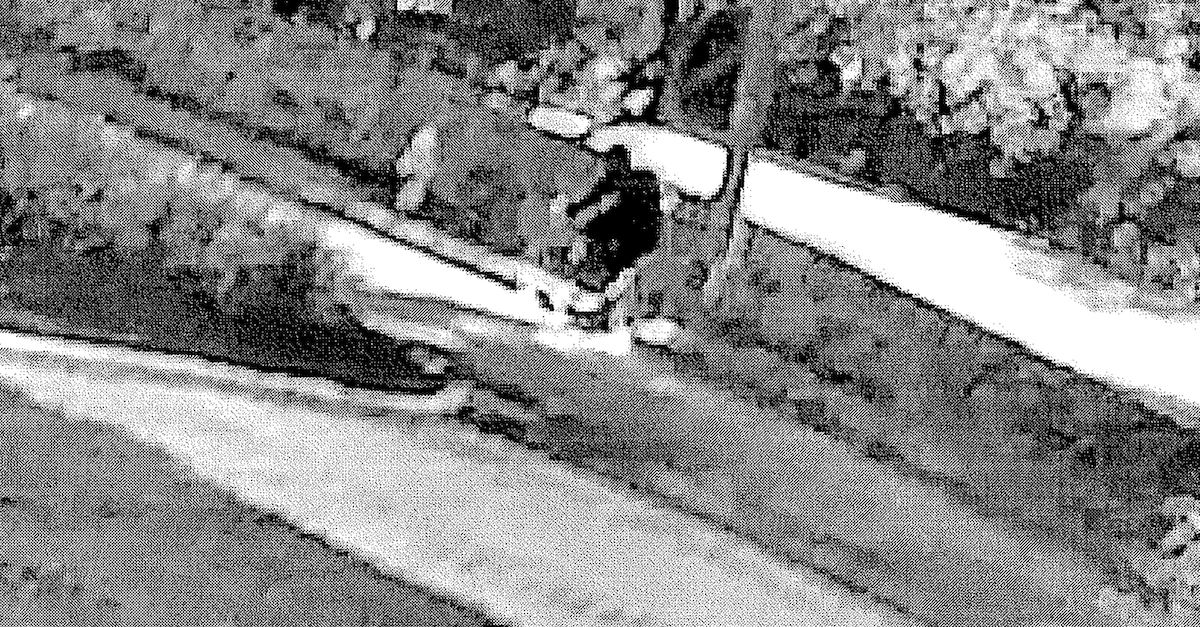
Surveillance video from an unaffected house on Weed Street in New Canaan, Conn., shows a man on a bicycle who prosecutors say is Fotis Dulos. A defense attorney for Michelle Troconis has suggested that the man in the image is Pawel Gumienny. (Image via an exhibit to a court filing.)
During his Sept. 6 conversation with prosecutors, court papers say Schoenhorn again refused to say which “attorney” gave him the mysterious banker’s box; rather, he would only admit that his “office” came into possession of the items inside it.
The state’s motion continues:
Schoenhorn suggested that the sweatshirt had been in different places and handled by “several” other persons prior to his “office” receiving it. Schoenhorn stated that, upon seeing the Weed Street [surveillance] footage, he believed that the sweatshirt should be turned over to the police. Schoenhorn stated that he recently filed another motion for a bill of particulars, in part, to determine whether the State was alleging that Gumienny was a coconspiratory, and he referenced Gumienny’s statement to police, wherein Gumienny discussed finding a blue sweatshirt inside of a red bucket in his Tacoma. Schoenhorn reminded Manning and McGuinness [the prosecutors] that he had encouraged them to ask Gumienny about the sweatshirt, and Manning informed Schoenhorn that the State had already inquired, but Gumienny could not confirm whether it was his sweatshirt or not.
McGuinness stated to Schoenhorn that the defendant’s hair was found on the sweatshirt, and the defendant’s hair was found on the sweatshirt, and the defendant’s DNA was on a tool located in the box. Schoenhorn replied that he did “not know anything about tools in the box.” McGuinness stated that Schoenhorn’s contention about the tools was a “problem” because a letter authored by Schoenhorn to Knight was found inside of the box with the tools. Manning eventually informed Schoenhorn that, because he would not reveal additional information relating to the sweatshirt, the State would be pursuing a motion to disqualify him. Schoenhorn asserted that he would not stipulate to “anything” and that an evidentiary hearing on his disqualification will be necessary.
According to the state’s motion, a subsequent conversation with Bowman, Troconis’s first attorney, revealed that Bowman had given the banker’s box to Schoenhorn. Bowman indicated that he “did not receive the box from the defendant,” the motion states, and he could not recall who gave it to him. He suggested that perhaps Norm Pattis, Fotis Dulos’ firebrand attorney at the time of his death, had handed the material to him; again, he wasn’t sure.
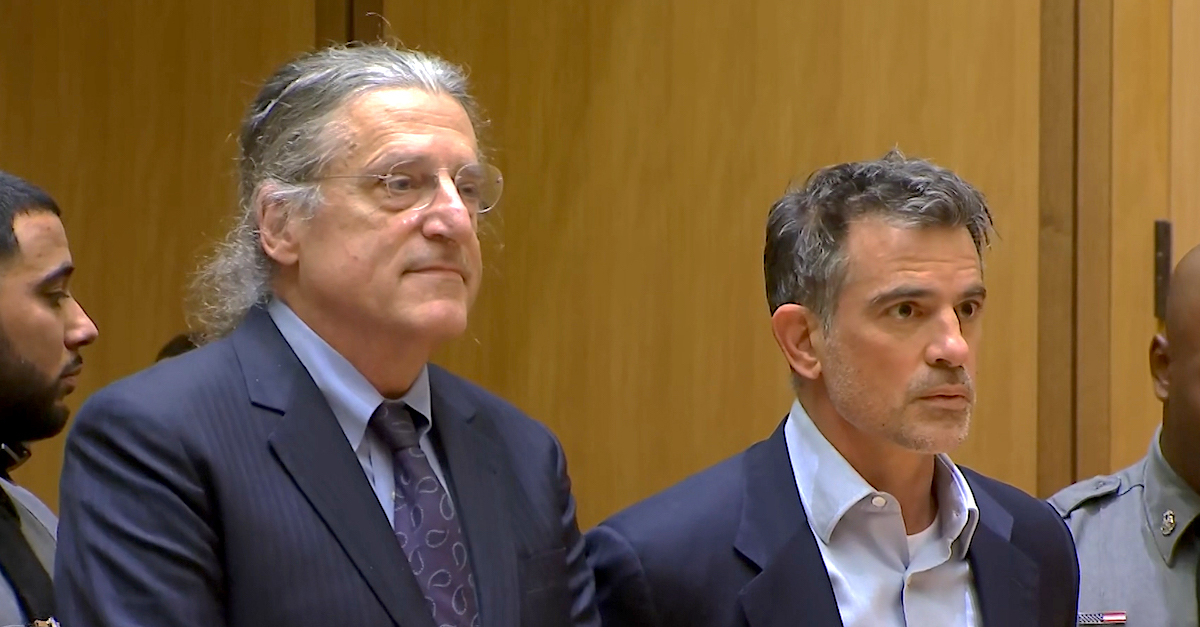
Defense attorney Norm Pattis (left) and Fotis Dulos (right).
Citing the relevant laws in play, the state’s motion lauds the right of a defendant to secure private counsel and admits that the disqualification of an attorney is a “drastic measure.” However, citing case law, the state argues that the right to an attorney of one’s choice “is not absolute” and must yield to ethics rules that ban attorneys from representing clients in proceedings where the attorney may be called as a witness.
Specifically, “Schoenhorn indicated that he ‘knew where [the sweatshirt] came from,'” the state argued, yet “he refuses to reveal such information, invoking the privileges of attorney-client and work product.”
“Given these facts,” the state continued, “Schoenhorn would become a necessary witness in this case should he, as he has indicated, seek to introduce the sweatshirt, and there is a compelling need for his testimony because the State is entitled to explore at trial the circumstances of where the sweatshirt came from, how it came into his or his office’s possession, and how it was handled by him or anyone else while he was its custodian for approximately one year.”
The state then posited in a footnote a list of questions Schoenhorn may be pressed to answer under oath about the box of evidence in question and the items contained therein.
Citing an ethics treatise, the state asserted that a lawyer who moves, tests, or meddles with evidence “may be compelled to disclose” information about it “even if the information came from confidential client communications.”
The state eventually noted that Schoenhorn “injected himself into this case as a witness” by taking possession of the box, noting its contents, and passing it along. Later, it slammed Schoenhorn for “h[o]ld[ing] onto the sweatshirt for approximately one year before turning it over to the police pursuant to his ethical obligations.”
The state then posited several ethical quagmires, such as the possibility that Schoenhorn would be forced to bolster his own testimony during closing arguments in order to sell his hypothetical theory that Gumienny was the killer and, therefore, given her lack of concrete connections to him, that Troconis is innocent.
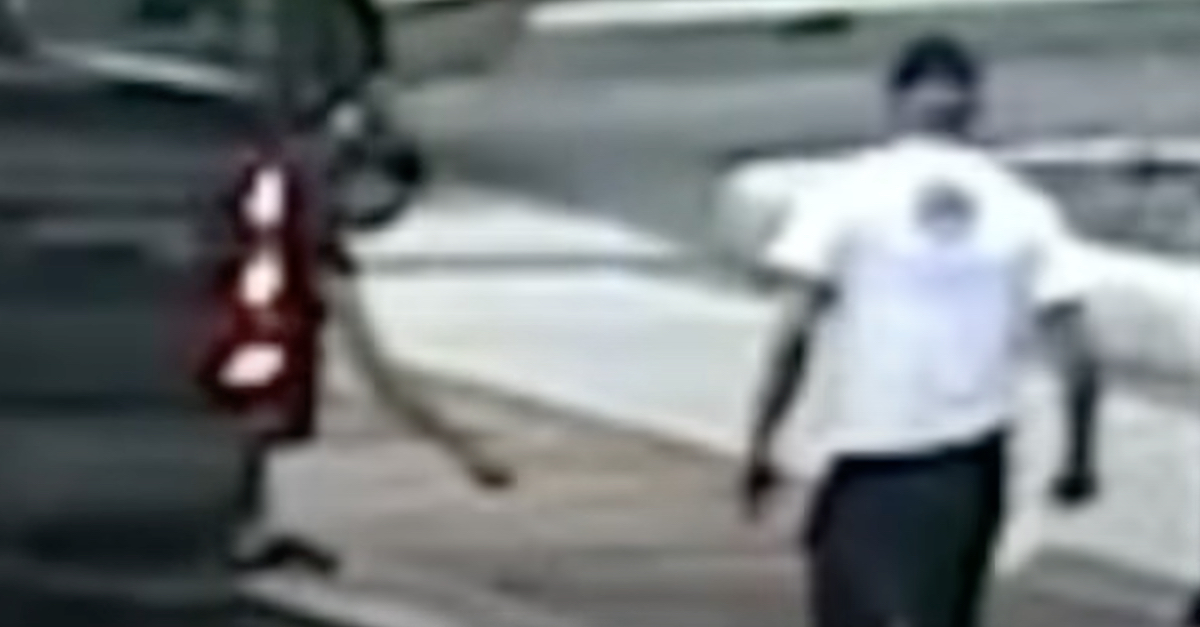
A surveillance image shows Michelle Troconis (left) wiping her hand on the ground as Fotis Dulos (right, white shirt) returns to a vehicle the pair was seen riding in after Jennifer Dulos was murdered. Troconis has said she was merely along for the ride and that the couple was grabbing coffee. Prosecutors say Fotis Dulos made several stops around Hartford, Conn., to dispose of evidence.
Schoenhorn fired back at the state’s assertions in a separate filing. He called the state’s attempt to jettison him from the case a “wholly meritless and outrageous effort to violate the defendant’s rights under the Sixth and Fourteenth Amendments.”
“[T]here is nothing that defense counsel can testify to in the state’s case that in any possible way advances the search for truth,” Schoenhorn continued.
He then slammed the state for trying to learn what he “may or may not know about the state’s evidence or the incompetence of the police investigation” and suggested that there was “no . . . scenario under which” he would “divulge any information on the stand” as part of the state’s “desperate ploy” to ascertain the “weakness of its case.”
Schoenhorn then claimed the sweatshirt “strongly implicates Pawel Gumienny in possible criminal involvement” in the Jennifer Dulos disappearance.
In an email to Connecticut reporters, Schoenhorn described the state’s motion as a “frivolous” attempt to deny Troconis her “[S]ixth [A]mendment right to counsel.”
“The state apparently is willing to go to outrageous length to go after my client and to deny her a fair trial and that includes getting rid of me,” Schoenhorn said. “To be clear: I am not going anywhere voluntarily. PERIOD. This pathetic move just demonstrates the weakness of the case against Michelle. It also suggests that police investigators were incompetent by failing to look at other suspects who may or may not have had something to with the unexplained 2019 disappearance of Jennifer Dulos.”
The state’s brief notes that the case will likely not be ready for trial at any point “in the immediate future.” That’s because Schoenhorn is separately suing for access to a transcript in the divorce proceedings between Jennifer and Fotis Dulos; that case is currently being briefed before the Connecticut Supreme Court.
The state’s filing is here; Schoenhorn’s is here.
Editor’s note: the court documents referenced in this piece conflict as to the spelling of a last name. Prosecutors have spelled Dulos’s associate’s name as Pawel Gumienny in past filings; Schoenhorn’s filing spells it the same way. However, in their instant filing, prosecutors used the spelling “Guminenny.” The latter appears to be incorrect, and Law&Crime has altered some of the quotes in this piece to employ what appears to be the correct spelling.
[Featured images as follows: Troconis and Schoenhorn via the Law&Crime Network; Jennifer Dulos via the New Canaan, Conn. Police Department.]
Have a tip we should know? [email protected]